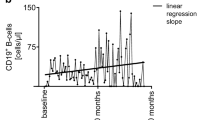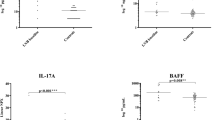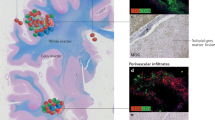Abstract
Introduction
Opsoclonus-myoclonus syndrome (OMS) is an autoimmune paraneoplastic disorder characterized by B and T cell abnormalities in cerebrospinal fluid (CSF) and propensity for relapse. The study aim was to assess whether rituximab-induced B cell ablation in CSF outlasts repopulation in blood and if there are changes in other lymphocyte subsets.
Materials and Methods
In 25 children with OMS, the expression of CSF and blood lymphocyte surface antigens was evaluated by flow cytometry before and at intervals after rituximab therapy.
Results
The reduction in CSF CD27+ memory, CD38+ activated, CD5+, and other B cell subsets was profound (p < 0.0001), comparable across groups (−94%), and sustained over 12–18 months despite repopulation in blood. The observed lag in memory B cell pool recovery in the CSF compared to peripheral blood may be clinically relevant. T cell phenotypic changes involved frequency, not absolute counts, and were transient. Co-treatment with IVIg or ACTH did not significantly alter B cell depletion or repletion.
Discussion
These data indicate that rituximab affords long-term protection against CSF B cell expansion in OMS (ClinicalTrials.gov NCT00244361).



Similar content being viewed by others
References
Stüben J-P. B cell-targeted therapy with rituximab and autoimmune neuromuscular disorders. J Neuroimmunol. 2008;204:1–12.
Monson NL, Cravens PD, Frohman EM, Hawker K, Racke MK. Effect of rituximab on the peripheral blood and cerebrospinal fluid B cells in patients with primary progressive multiple sclerosis. Arch Neurol. 2005;62:258–64.
Cross AH, Stark JL, Lauber J, Ramsbottom MJ, Lyons J. Rituximab reduces B cells and T cells in cerebrospinal fluid of multiple sclerosis patients. J Neuroimmunol. 2006;180:63–70.
Pestronk A, Florence J, Miller T, Choksi R, Al-Lozi MT, Levine TD. Treatment of IgM antibody associated polyneuropathies using rituximab. J Neurol Neurosurg Psychiatry. 2003;74:485–9.
Anolik JH, Friedberg JW, Zheng B, Barnard J, Owen T, Cushing E, et al. B cell reconstitution after rituximab treatment of lymphoma recapitulates B cell ontogeny. Clin Immunol. 2007;122:139–45.
Pers JO, Daridon C, Bendaoud B, Devauchelle V, Berthou C, Saraux A, et al. B-cell depletion and repopulation in autoimmune diseases. Clin Rev Allergy Immunol. 2008;34:50–5.
Tokunaga M, Saito K, Kawabata D, Imura Y, Fujii T, Nakayamada S, et al. Efficacy of rituximab (anti-CD20) for refractory systemic lupus erythematosus involving the central nervous system. Ann Rheum Dis. 2007;66:470–5.
Tate ED, Allison TJ, Pranzatelli MR, Verhulst SJ. Neuroepidemiologic trends in 105 US cases of pediatric opsoclonus-myoclonus syndrome. J Pediatr Oncol Nurs. 2005;22:8–19.
Tate ED, Pranzatelli MR, Harber JA, Travelstead AL, Verhulst SJ, Fenton GA, et al. Pharmacokinetic and time-course study of rituximab in pediatric opsoclonus-myoclonus syndrome. Ann Neurol. 2007;62(suppl 11):S113.
Pranzatelli MR, Tate ED, Travelstead AL, Longee D. Immunologic and clinical responses to rituximab in a child with opsoclonus-myoclonus. Pediatrics. 2005;115:e115–9.
Pranzatelli MR, Travelstead AL, Tate ED, Allison TJ, Verhulst SJ. CSF B cell expansion in opsoclonus-myoclonus syndrome: a biomarker of disease activity. Mov Disord. 2004;19:770–7.
Pranzatelli MR, Tate ED, Travelstead AL, Barbosa J, Bergamini RA, Civitello L, et al. Rituximab (anti-CD20) adjunctive therapy for opsoclonus-myoclonus syndrome. J Pediatr Hematol/Oncol. 2006;28:585–93.
Pranzatelli MR, Travelstead AL, Tate ED, Allison TJ, Moticka EJ, Franz DN, et al. B- and T-cell markers in opsoclonus-myoclonus syndrome: immunophenotyping of CSF lymphocytes. Neurology. 2004;62:1526–32.
Pranzatelli MR. The immunopharmacology of the opsoclonus-myoclonus syndrome. Clin Neuropharmacol. 1996;19:1–47.
Comans-Bitter WM, De Groot R, van den Beemd R, Neijens HJ, Hop WC, Groeneveld K, et al. Immunophenotyping of blood lymphocytes in childhood. Reference values for lymphocyte subpopulations. J Pediatr. 1997;130:388–93.
Sanz I, Anolik JH, Looney RJ. B cell depletion therapy in autoimmune diseases. Front Biosci. 2007;12:2546–67.
Petereit HF, Moeller-Hartmann W, Reske D, Rubbert A. Rituximab in a patient with multiple sclerosis—effect on B cells, plasma cells and intrathecal IgG synthesis. Acta Neurol Scand. 2008;117:399–403.
Stüve O, Cepok S, Elias B, Saleh A, Hartung HP, Hemmer B, et al. Clinical stabilization and effective B-lymphocyte depletion in the cerebrospinal fluid and peripheral blood of a patient with fulminant relapsing–remitting multiple sclerosis. Arch Neurol. 2005;62:1620–3.
Sidner RA, Book BK, Agarwal A, Bearden CM, Vieira CA, Pescovitz MD. In vivo human B-cell subset recovery after in vivo depletion with rituximab, anti-human CD20 monoclonal antibody. Hum Antib. 2004;13:55–62.
Vallerskog T, Gunnarsson I, Widhe M, Risselada A, Klareskog L, van Vollenhoven R, et al. Treatment with rituximab affects both the cellular and the humoral arm of the immune system in patients with SLE. Clin Immunol. 2007;122:62–74.
Bernasconi NL, Onai N, Lanzavecchia A. A role for Toll-like receptors in acquired immunity. Upregulation of TLR9 by BCR triggering in naïve B cells and constitutive expression in memory B cells. Blood. 2003;101:4500–4.
Looney RJ, Anolik JH, Campbell D, Felgar RE, Young F, Arend LJ, et al. B cell depletion as a novel treatment for systemic lupus erythematosus: a phase I/II dose-escalation trial of rituximab. Arthritis Rheum. 2004;50:2580–9.
Roll P, Palanichamy A, Kneitz C, Dorner T, Tony HP. Regeneration of B cell subsets after transient B cell depletion using anti-CD20 antibodies in rheumatoid arthritis. Arthritis Rheum. 2006;54:2377–86.
Genberg H, Hansson A, Wernerson A, Wennberg L, Tydén G. Pharmacodynamics of rituximab in kidney allotransplantation. Am J Transplant. 2006;6:2418–28.
Leandro MJ, Cambridge G, Ehrenstein MR, Edwards JC. Reconstitution of peripheral blood B cells after depletion with rituximab in patients with rheumatoid arthritis. Arthritis Rheum. 2006;54:613–20.
Stasi R, Del Poeta G, Stipa E, Evangelista ML, Trawinska MM, Cooper N, et al. Response to B-cell depleting therapy with rituximab reverts the abnormalities of T-cell subsets in patients with idiopathic thrombocytopenic purpura. Blood. 2007;110:2924–30.
Agarwal A, Vieira CA, Book BK, Sidner RA, Fineberg NS, Pescovitz MD. Rituximab, anti-CD20, induces in vivo cytokine release but does not impair ex vivo T cell responses. Am J Transplant. 2004;4:1357–60.
Acknowledgments
Supported by a clinical trial contract (study number U2743s) to M.R.P. from Genentech, Inc. (South San Francisco, CA)/Biogen IDEC (San Diego, CA) and by grants from the Spastic Paralysis and Allied Diseases of the Central Nervous System Research Foundation (Illinois-Eastern Iowa District Kiwanis International) and Questcor Pharmaceuticals, Inc. (Union City, CA, USA). The authors thank Jennifer A. Swan for dataset graphics, Tammy A. Boyd for typing the manuscript, and patients for providing samples for this analysis.
Author information
Authors and Affiliations
Corresponding author
Rights and permissions
About this article
Cite this article
Pranzatelli, M.R., Tate, E.D., Travelstead, A.L. et al. Long-Term Cerebrospinal Fluid and Blood Lymphocyte Dynamics After Rituximab for Pediatric Opsoclonus-Myoclonus. J Clin Immunol 30, 106–113 (2010). https://doi.org/10.1007/s10875-009-9335-3
Received:
Accepted:
Published:
Issue Date:
DOI: https://doi.org/10.1007/s10875-009-9335-3




